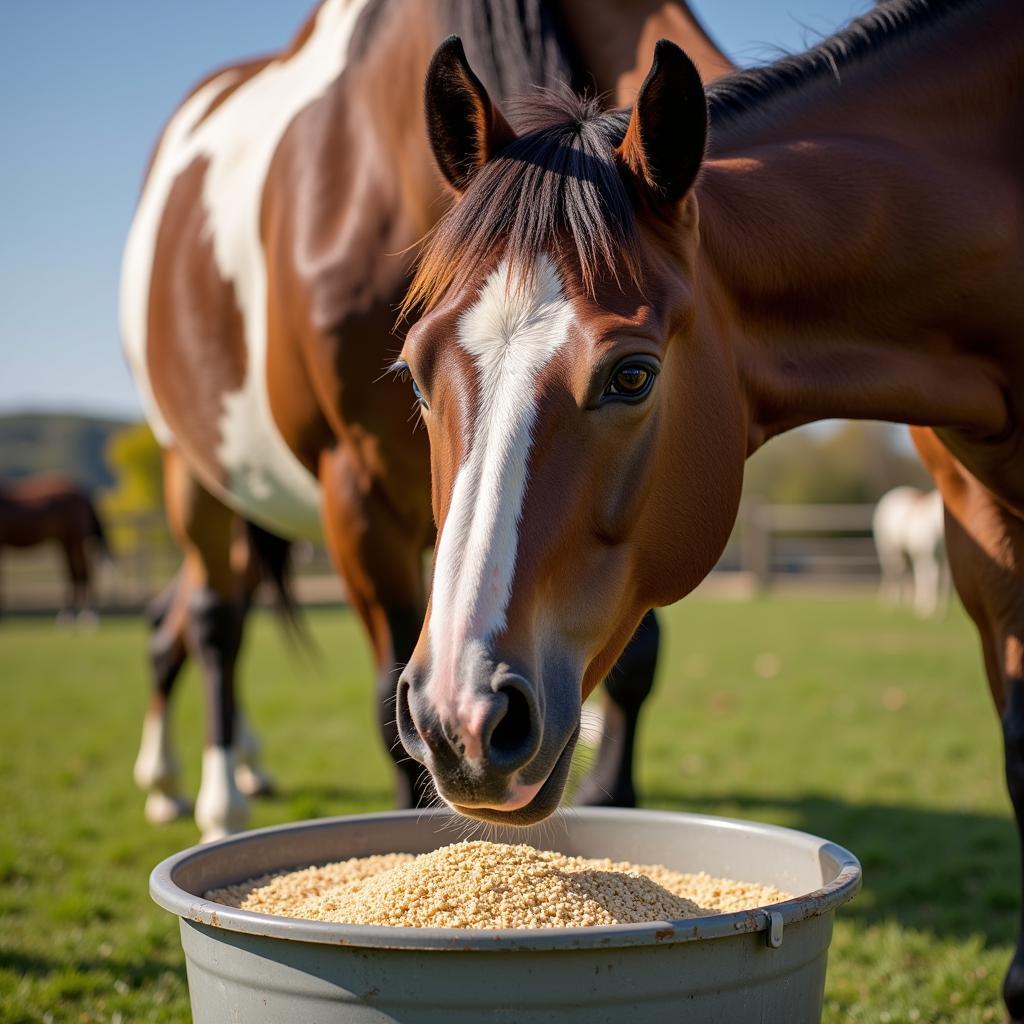Magnesium Supplements For Horses are often overlooked, yet they play a vital role in various bodily functions, impacting everything from muscle function and nerve transmission to bone health and stress management. Ensuring your horse receives adequate magnesium is crucial for maintaining their overall well-being and optimizing their athletic potential. Let’s delve into the world of magnesium for horses and discover why supplementation can be beneficial.
Why is Magnesium Important for Horses?
Magnesium is an essential mineral for horses, acting as a cofactor in over 300 enzymatic reactions within the body. It contributes significantly to muscle relaxation, nerve function, energy production, and calcium regulation. A deficiency in magnesium can lead to a range of problems, including muscle tremors, nervousness, and even seizures.
For performance horses, maintaining optimal magnesium levels is even more critical. During strenuous exercise, magnesium levels can deplete rapidly, leading to muscle fatigue, cramping, and reduced performance. Supplementation can help replenish these lost stores and support optimal muscle function. kelp for horses can also be a natural source of essential minerals, including magnesium.
How Do I Know if My Horse Needs Magnesium?
Recognizing the signs of magnesium deficiency in horses can be challenging, as they often mimic other conditions. Some common symptoms include:
- Muscle twitching or tremors
- Increased excitability and nervousness
- Sensitivity to touch or sound
- Reluctance to work or exercise
- Stiffness and muscle soreness
- Tying up (Exertional Rhabdomyolysis)
If you suspect your horse may be magnesium deficient, consult with your veterinarian for a proper diagnosis and to determine the appropriate course of action. A blood test can accurately assess magnesium levels and confirm a deficiency.
Choosing the Right Magnesium Supplement for Your Horse
The market offers a variety of magnesium supplements for horses, each with its own advantages and disadvantages. Common forms include magnesium oxide, magnesium chelate, and magnesium sulfate.
- Magnesium Oxide: This is the most common and generally least expensive form, but it has lower bioavailability compared to other forms.
- Magnesium Chelate: Chelated magnesium is bound to an amino acid, enhancing its absorption and utilization by the body. While more expensive, it offers superior bioavailability.
- Magnesium Sulfate (Epsom Salts): Often used for soaking sore muscles, Epsom salts can also be administered orally, but its laxative effect should be considered.
When selecting a magnesium supplement, consider your horse’s individual needs, the severity of the deficiency (if any), and the advice of your veterinarian. You may also want to consider other calming supplements like calming pellets for horses or calming medicine for horses if your horse experiences anxiety or nervousness related to magnesium deficiency.
How Much Magnesium Should I Give My Horse?
The appropriate dosage of magnesium supplements for horses varies depending on the individual horse’s needs, the type of supplement used, and the severity of any deficiency. It’s essential to follow the instructions on the product label and consult with your veterinarian for guidance. Over-supplementation can lead to digestive upset and other health issues, so it’s crucial to administer the correct amount. “Providing the correct dosage is paramount,” says Dr. Emily Carter, equine veterinarian and nutritionist. “Too much magnesium can be just as detrimental as too little.”
Incorporating Magnesium Supplements into Your Horse’s Diet
Introducing magnesium supplements gradually is recommended to avoid digestive upset. Mix the supplement with your horse’s feed and monitor them for any adverse reactions.  Horse Consuming Magnesium-Supplemented Feed Providing loose salt and minerals for horses can also help ensure your horse receives a balanced intake of essential minerals. Remember that dietary changes should always be implemented gradually. Another option for supporting bone health and overall well-being is osteoform for horses, which may be beneficial in conjunction with magnesium supplementation.
Horse Consuming Magnesium-Supplemented Feed Providing loose salt and minerals for horses can also help ensure your horse receives a balanced intake of essential minerals. Remember that dietary changes should always be implemented gradually. Another option for supporting bone health and overall well-being is osteoform for horses, which may be beneficial in conjunction with magnesium supplementation.
“A balanced diet is key to equine health,” advises Dr. Sarah Miller, an equine nutrition specialist. “Magnesium plays a vital role, and supplementation can be beneficial, particularly for performance horses or those with diagnosed deficiencies.”
In conclusion, magnesium supplements for horses can be a valuable tool in supporting their overall health, performance, and well-being. By understanding the importance of magnesium, recognizing the signs of deficiency, and choosing the right supplement, you can help your horse thrive. Always consult with your veterinarian for personalized advice and to ensure the safety and efficacy of any supplementation program.
FAQ
- What are the benefits of magnesium for horses?
- How can I tell if my horse is magnesium deficient?
- What are the different types of magnesium supplements available?
- How much magnesium should I give my horse?
- What are the potential side effects of magnesium over-supplementation?
- Can I give my horse Epsom salts for magnesium supplementation?
- Should I consult with my vet before giving my horse magnesium?
For further assistance, please contact us at Phone: 0772127271, Email: [email protected] or visit our location: QGM2+WX2, Vị Trung, Vị Thuỷ, Hậu Giang, Việt Nam. Our customer service team is available 24/7.